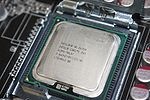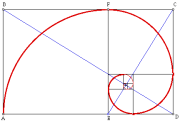Upgrading Your CPU – Conclusion(s)
Replacing or Upgrading Your CPU
When my Windows 7 upgrade disc arrived in the mail last week, it triggered in me an urge to do a more extravagant hardware upgrade to the machine I intended to install Win 7 on.  This urge resulted in me pulling out the OEM RAM and the E2200 dual core CPU and installing 8 GB’s of matched pairs of high performance DDR2 RAM and a Q9550 Core 2 Quad.
This urge resulted in me pulling out the OEM RAM and the E2200 dual core CPU and installing 8 GB’s of matched pairs of high performance DDR2 RAM and a Q9550 Core 2 Quad.
A fairly significant “performance upgrade”.
* See Windows 7 64-bit Adventures and Pt 1, Replacing or Upgrading Your CPU
In parts 2 and 3 (Replacing or Upgrading Your CPU – Pt 2 and Upgrading the CPU pt3 – Selecting A Processor) I described the process for determining which processors will ‘fit’  and function on your machine, and then how to look at benchmark scores for the different CPU models.
and function on your machine, and then how to look at benchmark scores for the different CPU models.
That brings us up to date.
Now that you know what CPU’s to look at (and which won’t fit) you can look at and compare prices and benchmarks to find the right CPU deal for you. In my real life example, I happened to find the Q9550 for well under $200, and I was satisfied with its rankings on CPU performance charts.. The deal you find, and CPU you prefer, may very well vary (there are better CPU’s than the Q9550).
CPU “Factors”
| # of cores | Speed | Wattage | Performance |
Three of these processor “factors” — # of cores, clock speed, and “performance” — will be reflected in the benchmark scores, so you don’t need to study and become an expert on each of those. The general rule of “more is better” (typically) applies here.
But when considering a CPU replacement/upgrade, you also want to look at the processor’s Watts.. and one other factor I’ll get to in a moment.
1) Look up the Watts on your old processor.
In my RL example, an E2200, which is rated at 65W.
2) Look at the Watts on the processor type you’re considering.
In my RL example, a Q9550, which is rated at 95W. (Also, try to find “recommended power supplies for”, and make a note of the most mentioned Wattage.)
3) Look at the Watts on your PSU (power supply unit).
Now it’s time for a little math — I know, yippee.
Continuing on with my RL example, we can see that my new processor draws 30W more power than the old one: further research shows that the most frequently mention recommended PSU Wattage is 500W: and when I plug my system’s components into the eXtreme Power Supply Calculator (and allow 20% for capacitor aging) I get a result of minimum = 315W (which seems low).
My power supply happened to be rated at 500W, and so I felt I could do the upgrade without also upgrading my power supply. But you may need to, and that is an additional expense that you should factor into your thinking and your budget. (See question #2 here, for the how to)
Another “factor” for consideration is heat (and therefore, cooling). My processor will produce more heat (higher Wattage, more cores..) than its predecessor did, and so I downloaded and installed SpeedFan to better help me keep an eye on the temperatures inside my case. Heat is the enemy of electronics, and letting your chips get too hot will kill them.
So you may need to protect your investment by upgrading the cooling in your computer case as well.. and that is an additional expense that you should factor into your thinking and your budget.
In conclusion:
So there you have it. It only took me 4 articles to describe all the most relevant considerations for a hardware upgrade, and if you do all those things, you should have a pretty good idea of your own personal “upgrade path”.
I was lucky: I did not have to upgrade my power supply, and it appears I won’t have to upgrade my cooling. My upgrade – 8 GB’s of matching RAM and a quad-core CPU – cost me right around $300. It could have easily been more.
So my upgrade to 64-bit Windows 7 and high performance components turned my machine into a real speed demon, right? Well…
Several of my “Windows Experience” scores went from 5.2 to 7.5; and yes, my computer is a bit quicker and more responsive. I like how it behaves.
But, I liked it with the E2200 and the 3 GB’s nearly as well.
Currently, very few programs and games are written to take advantage of 64-bit, multiple processors, and multi-“threading”. Also, I have yet to put any load on it that could use the extra RAM. So, simply put, there is really very little noticeable “speed” improvement in my day-to-day usage… though there is some. (Games perform with less hesitation, but to really bump my fps, a graphics card upgrade would have been the proper “upgrade path”.)
Short version: I do not regret my upgrade, but I would not do this again; as my original equipment’s 5.2 scores (under Win7) were quite satisfactory. The E2200 is a much better CPU than its “low end” reputation had me thinking, and 3GB’s of RAM is enough in most cases.
To improve the performance of my aging gamer computer, I have decided against a hardware upgrade: I will pool my money and replace it with a new machine with the new “i7” architecture.. and donate the old one to charity.
Copyright 2007-9 © Tech Paul. All rights reserved.![]() post to jaanix
post to jaanix
| Share this post : |  |

 Subscribe to Tech--for Everyone by Email
Subscribe to Tech--for Everyone by Email












TechPaul,
You had me initially thinking upgrade for myself; however, after following these articles, I will probably hang in there with my current setup.
This was a great series of articles that presented honest outcomes and results.
Rick
LikeLike
Rick,
Thank you. I try to write “for everyone”, and by that I mean “the average computer user”.
I hope the information will be helpful if they need to replace a defunct CPU.. And help the budding “power users” and Junior Über Geeks understand all that’s involved.
(To properly upgrade my gaming rig, for example, I would need an X58 motherboard, the CPU, 6 GB’s of DDR3, and a beefier PSU, and since I would also have two graphics cards generating heat in there, a more efficient CPU cooler as well. Those items add up!)
LikeLike
Great conclusion TechPaul. I agree that there is a sweet spot for RAM. I have not been able to see much of a difference after I gave gotten above 2-3 GB. I am still using XP/Vista though on my machines. I do, however, play a lot of games. This is where the upgraded CPU has been noticable for me. I have been able to get higher frames per second on higher settings with a better CPU.
LikeLike
Dominic,
As you probably know, you need a 64-bit version of Windows to utilize more than 3.5 GB’s of RAM.. My only real advice there is to “pair” dual-channel RAM, and “triple” DDR3.
Yes, the CPU can improve game frame rate (particularly if the graphics are “onboard” [vs “discrete”]) as well as reduce the time it takes between levels “loads” to load up. But I stick by my advice that gamers look to graphics cards as their preferred “upgrade path”.
LikeLike
Paul,
Thanks for the well-written and understandable article.
I don’t know if you take questions here, but I figure I’d give it a try. I’d like to upgrade my AMD PHENOM Quad core 1.8 Ghz cpu (came with an HP computer) to something much more substantial, something along the lines of 3.0 Ghz. The wattage of the current cpu is 65 watts (info from AMD site). The cpu’s I’m looking at are 125 watts.
My motherboard specs say that it can only handle CPU’s up to 95 watts. My power supply is 250 watts.
My question is, can I replace the cpu with a 125 watter by increasing the power supply, or am I stuck with CPU’S up to 95 watts because that’s all the motherboard can handle, regardless of the power supply. Thanks in advance..
LikeLike
JUDGEMAN,
I do not have direct experience with trying what you are asking, so I cannot tell you what an AMD CPU that is expecting 125W will do if it only gets 95W… nor, even if trying it will ruin the chip. (You might contact AMD…)
But experience has taught me that when upgrading for a specific CPU, a PSU/mobo/CPU “combo upgrade” is pretty standard fair.
In your case, I would say the PSU upgrade is mandatory, and that you should probably either choose a 95W (or lower) CPU or also upgrade the mobo. That’s my vote.
LikeLike